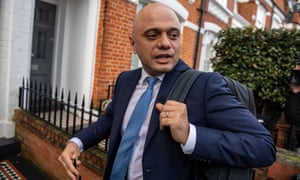 |
| Sajid Javid arrives home after quitting as chancellor. Photograph: Chris J Ratcliffe/Getty Images |
“The wiring of power in Downing Street is systemically dysfunctional,” Dominic Cummings wrote in a furious 2018 blogpost about the failure of Theresa May’s government to make Brexit happen.
Thursday’s ruthless reshuffle made clear that he and Boris Johnson are determined to subject the top of government to a radical rewiring, and never mind the risk of shocks.
Most visibly, with less than a month to go before the budget that is meant to draw a line under a decade of austerity and “unleash Britain’s potential”, Johnson has taken back control of the Treasury.
No 10 could not have been sure how Johnson’s former leadership rival, Sajid Javid, would have responded to the demand that he sack his key policy advisers and instead accept guidance from the prime minister’s team. But they knew there was a strong possibility he would choose to walk: and they had a ready-made, super-loyal successor on hand just in case, in the form of Rishi Sunak, already chief secretary to the Treasury.
Whatever the disruption involved, they appear to have been determined to enable Johnson and his key aides to exert much more direct control over economic and fiscal policy, which will have to be at the heart of the prime minister’s plan to “level up” the UK.
Cummings’ influence can of course be overstated - and other key advisers including Lee Cain and Munira Mirza, both central to Johnson’s project, will also celebrate the assertion of No 10’s authority.
But there is little doubt that Cummings places loyalty and the ruthless removal of any impediments to the prime minister’s authority at the centre of his approach.
Across departments, the changes smacked of a determination to reward loyalty and enforce unity.
The secretary for Northern Ireland, Julian Smith, who had been critical of some aspects of Brexit policy, was chucked out despite his success in resurrecting Stormont. By comparison, the Brexit true-believer Suella Braverman, who backed the prorogation of parliament which was found to be illegal by the supreme court, moves up to replace the sonorous Geoffrey Cox as attorney general. Amanda Milling, one of the four MPs who holed up with Johnson in his Oxfordshire home in 2016 as he plotted his first, short-lived tilt at the leadership, joins the cabinet.
At least in her early days, Theresa May treated reshuffles as a perilous political balancing act; making Johnson her foreign secretary, for example, despite being unconvinced by either his Brexit stance or his ability.
But her cabinet ended up being, as the then chief whip Smith put it, the “worst example of ill-discipline in cabinet in British political history”.
With an 80-seat majority, Johnson has no need of such niceties, and he and Cummings are impatient to get on with their “levelling up” plans.
Downing Street described the proposal that was put to Javid, of a joint No 10-No 11 team of advisers – from which almost all of his current team would be left out – as a way of ensuring chancellor and prime minister “rise and fall together”. But it would also have been read as a humiliation for a man who had already been described in hostile briefings as “chino”: chancellor in name only.
Clashes between Javid and Cummings – and between Javid’s advisers and No 10 officials - had been whispered about at Westminster for weeks.
Allies had insisted the two men themselves got on well “at a personal level”, and Javid also has close links to the prime minister’s influential partner, Carrie Symonds, who once worked for him.
But Johnson and his team were irked at a series of briefings about Javid’s role in big decisions – including pre-empting the announcement on HS2 by revealing the Treasury would back it. And there have been some policy differences, too, though No 10 insist these formed no part of the conversation on Thursday morning.
Johnson wants to take advantage of his chunky majority and a full parliamentary term to make some potentially controversial decisions, including on tax and spending, and Javid’s instincts, insiders say, were more “small-c” conservative.
The chancellor had made clear his willingness to be considerably more flexible in sanctioning big-ticket spending than his predecessor, “Spreadsheet Phil” Hammond.
In his one set-piece speech during the election campaign, he set out something similar to Gordon Brown’s “golden rule”, allowing long-term investment spending – including the prime minister’s beloved infrastructure projects – to be funded by borrowing. That in itself is a revolution in Conservative thinking.
But Javid also stressed that he was determined to balance the current budget, as it is known – funding day-to-day spending through tax receipts. And that would constrain how much Johnson has available for upfront spending pledges, unless the government is willing to raise more tax.
Radical plans have been floated in recent weeks, including a “mansion tax” on the most expensive homes, and, possibly more likely, a review of council tax bands to ensure the wealthier pay a higher rate.
But perhaps remembering George Osborne’s pasty tax “omnishambles” budget – and more recently, Hammond being forced to ditch a modest increase in national insurance after a backbench backlash – Javid, close sources say, was more cautious.
Sunak is likely to have no such scruples – nor the independent power-base to act as a counterweight to No 10. Which, of course, is the point. Cummings watched the months-long tussle between May and Hammond with scorn.
Next month’s budget is likely to mark a dramatic break with the past 10 years. And judging by Thursday’s events, sceptics – inside and outside government – face being swatted aside, even if they happen to be the chancellor of the exchequer.
That 2018 Cummings piece, which mused on the threat posed by Jeremy Corbyn’s Labour party if the Tories did not get their act together, concluded: “If revolution there is to be, better to undertake it than undergo it”.
https://www.theguardian.com/politics/2020/feb/13/sajid-javids-exit-leaves-boris-johnson-in-control-of-treasury